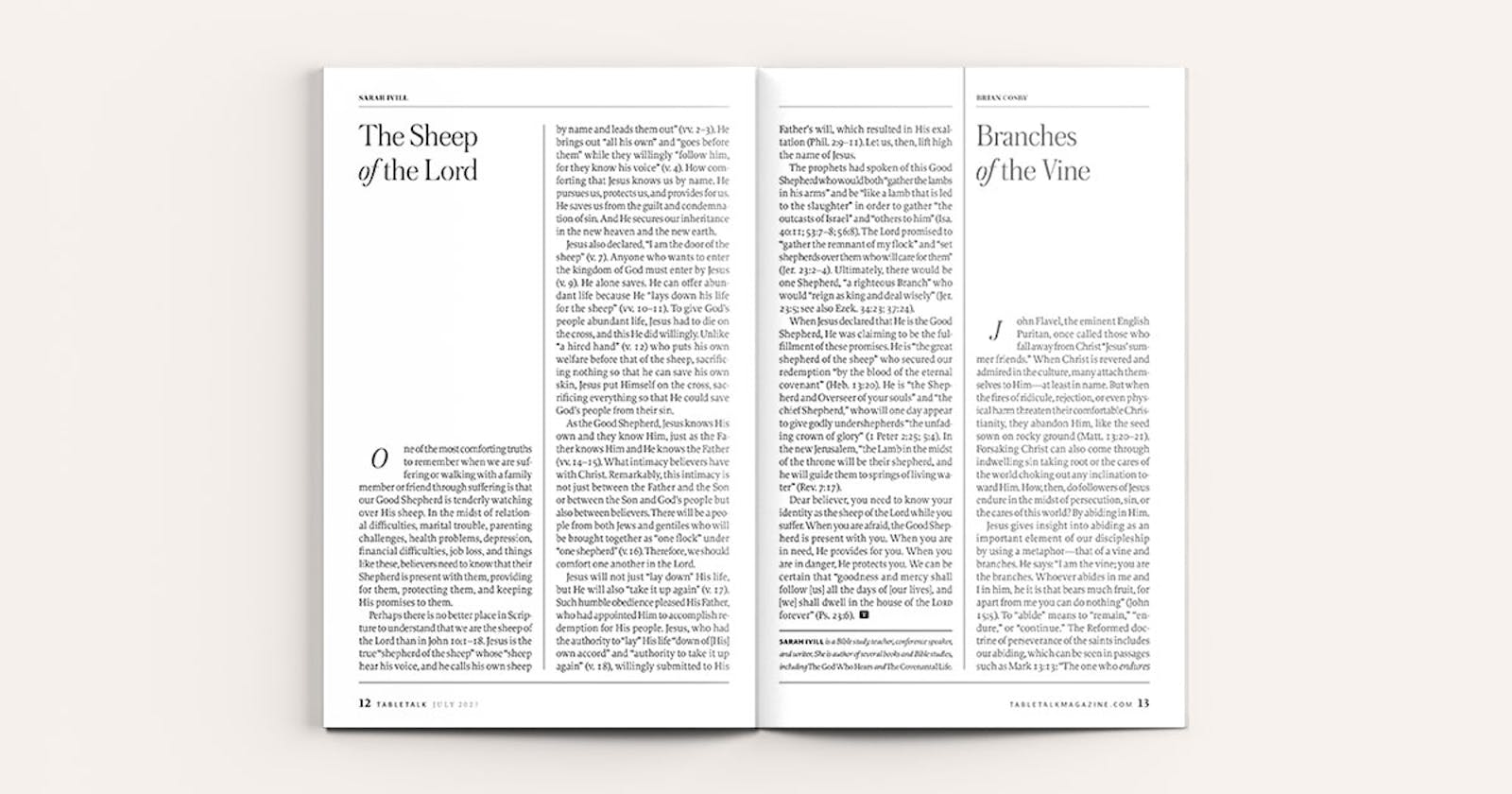
Request your free, three-month trial to Tabletalk magazine. You’ll receive the print issue monthly and gain immediate digital access to decades of archives. This trial is risk-free. No credit card required.
Try Tabletalk NowAlready receive Tabletalk magazine every month?
Verify your email address to gain unlimited access.
John Flavel, the eminent English Puritan, once called those who fall away from Christ “Jesus’ summer friends.” When Christ is revered and admired in the culture, many attach themselves to Him—at least in name. But when the fires of ridicule, rejection, or even physical harm threaten their comfortable Christianity, they abandon Him, like the seed sown on rocky ground (Matt. 13:20–21). Forsaking Christ can also come through indwelling sin taking root or the cares of the world choking out any inclination toward Him. How, then, do followers of Jesus endure in the midst of persecution, sin, or the cares of this world? By abiding in Him.
Jesus gives insight into abiding as an important element of our discipleship by using a metaphor—that of a vine and branches. He says: “I am the vine; you are the branches. Whoever abides in me and I in him, he it is that bears much fruit, for apart from me you can do nothing” (John 15:5). To “abide” means to “remain,” “endure,” or “continue.” The Reformed doctrine of perseverance of the saints includes our abiding, which can be seen in passages such as Mark 13:13: “The one who endures to the end will be saved” (emphasis added; the Greek word has the same root as the word translated “abide”). Abiding in Christ, then, is a postconversion fellowship with Christ and obedience to Him that results in bearing spiritual fruit and experiencing fullness of joy, to the glory of God.
How can you and I abide in Christ? Let me give you three ways. First, we abide in Christ through the ordinary means of grace—God’s Word, the sacraments, and prayer. Our fellowship with Christ and obedience to Him are strengthened and accomplished when we attend to the means by which God works to sanctify His people. When we read, meditate on, and memorize God’s Word and sit under biblical preaching and teaching, the Spirit accomplishes the purpose for which He sends the Word in the lives of His people (Isa. 55:11). When we come to the Lord’s Supper to feast on Christ by faith, God nourishes and strengthens that faith in Him. When we commune with God in prayer—pouring out our souls before Him—He ushers us into those green pastures of His transformative grace. The means of grace, then, are tangible expressions of our abiding in Christ.
Second, abiding in Christ includes abiding in gospel community. In John 15, the Greek word for “you” is plural (y’all, as we would say down South). Moreover, Jesus doesn’t say “branch” but “branches.” Those who are united to Christ are united to one another as members of the body and bride of Christ. But being spiritually united to one another is only the foundation for being physically, purposefully, servant-heartedly, and prayerfully united to one another in the bonds of love. This, of course, is best experienced within the local church. Jesus would go on to say several verses later, “This is my commandment, that you love one another as I have loved you” (v. 12). Abiding in Christ finds expression within the community of faith because God has provided fellow pilgrims to assist you in your own pilgrimage to the Celestial City. Gospel community is another means by which we endure.

Third, abiding in Christ leads to bearing spiritual fruit. To return to the metaphor in John 15, Jesus asserts, “As the branch cannot bear fruit by itself, unless it abides in the vine, neither can you, unless you abide in me” (v. 4). Bearing fruit of the Spirit (Gal. 5:22–23) is evidence of, and predicated on, our union with Christ. Dr. J.V. Fesko defines our union with Christ as that “intimate and spiritual union between Christ and His people by virtue of which He is the source of their life, strength, blessedness, and salvation.” Doing good works apart from abiding in Christ, then, is like stapling rotten fruit to a dead vine; such works have no true or enduring qualities. Branches have life—and can therefore bear fruit—only if connected to the true Vine. This is why Jesus stresses that “apart from me you can do nothing” (John 15:5). Let us therefore strive to produce fruit of the Spirit as a consequence and expression of our union and fellowship with Christ.
May we not be like Jesus’ “summer friends”—forsaking Him out of fear of persecution, indwelling sin, or the cares of this world. Rather, may we strive to grow in greater knowledge and love of Jesus as His disciples by endeavoring to abide in Him through the ordinary means of grace and gospel community so that we will bear much fruit for His glory and for our joy in Him.
